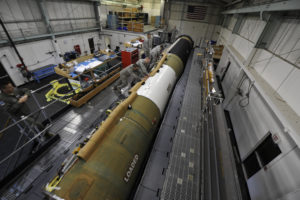
The House Appropriations Committee on Tuesday approved legislation that would slow development of next-generation, nuclear-tipped intercontinental ballistic missiles, along with Department of Energy infrastructure that supports them. The next stop for the two bills — which passed essentially along party lines, and without any amendments directly affecting nuclear arms spending — is the House floor. Committee Chair Nita Lowey (D-N.Y.) has said she expects the full House to vote on the bills in June. Together, the fiscal 2020 defense and energy and…

 By
By 











